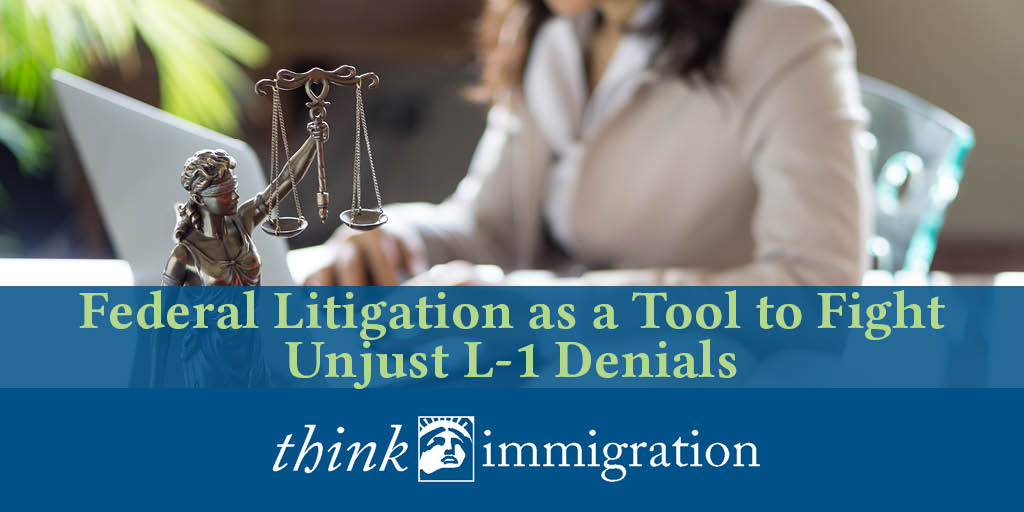Federal litigation empowers enterprise immigration attorneys to proper a mistaken.
Whether or not dealing with litigation in-house, co-counseling with an skilled litigator, or referring the matter out, practitioners ought to battle unreasonable denials in federal courtroom. That is significantly true for L-1 intracompany transferee petitions filed on behalf of founders and prime executives or managers of small companies.
I just lately took on, and received, a federal court case difficult an unjust L-1 denial. As I immersed myself within the case, I researched what was taking place to L-1s throughout the board, and every thing I discovered made me all of the extra resolved to battle for my consumer. I encourage my colleagues to observe swimsuit.
Enterprise Immigration Approval and Request for Proof Charges
L-1 petitions have the bottom approval fee of all employment-based nonimmigrant petitions and investor functions. L-1s are additionally the most definitely to be issued a request for proof (RFE).
In fiscal yr 2022, U.S. Citizenship and Immigration Companies (USCIS) denied 1 in 6 (16.4%) L-1 petitions, approving 83.6% of circumstances filed. Greater than a 3rd (36.5%) have been issued an RFE. Of these issued an RFE, fewer than two thirds (65.1%) have been permitted.
Different enterprise petitions have terribly completely different outcomes: USCIS permitted 98% of H-1B petitions and issued RFEs in solely 9.6% of the circumstances; permitted 94.6% of O petitions and issued RFEs in 20.7%; permitted 93.2% of P petitions and issued RFEs in 19.6%; and permitted 91.4% of TN petitions and issued RFEs in 17.1%. Consular posts overseas approved 92.5% of E-2 treaty investor visas and 94.2% of E-1 treaty dealer visas in fiscal yr 2021.

L-1s for Entrepreneurs and Small Companies
In 1970, Congress created the L classification to “eradicate issues . . . confronted by American corporations having workplaces overseas in transferring key personnel freely inside the group.” See H.R. Rep. 91-851 (1970).
The L-1 classification allows a U.S. firm to quickly switch an government (L-1A), supervisor (L-1A), or specialised data worker (L-1B), from considered one of its overseas workplaces to the USA. The person will need to have been working for the overseas entity in a primarily government, managerial, or specialised data capability for one yr inside the previous three years. The L-1 classification additionally allows a overseas firm to ship an worker to the USA to open a brand new workplace.
L-1s usually are not restricted to massive companies. In line with an instance within the USCIS Coverage Handbook, companies might make use of “only one or two people, including the beneficiary,” so long as non-managerial capabilities, reminiscent of “accounting, gross sales, warehousing, and personnel,” are outsourced.
For immigrants, one of many best benefits of the L-1A, is {that a} almost equivalent immigrant classification exists, the EB-1C, which results in everlasting residence, or a “inexperienced card.”
For the USA, the L-1 is an expressway to carry entrepreneurs, new companies, funding, and innovation to the nation. These companies create U.S. jobs, spur financial development, and assist America stay aggressive within the international market.
USCIS ought to approve small enterprise L-1s with confidence. Founders and house owners of those companies have a private stake of their firm’s success; not solely due to monetary funding and sweat fairness put into the enterprise, but additionally as a result of their proper to proceed to reside and work in the USA is determined by their firm’s development and prosperity.
Frequent Points with L-1 RFEs and Denials
USCIS is infamous for issuing prolonged requests for proof (RFEs) on L-1 petitions, significantly on these filed on behalf of homeowners and prime executives or managers of small companies.
Immigration Companies Officers (ISOs) usually query whether or not the beneficiary is an government or supervisor overseas and shall be an government or supervisor in the USA. ISOs achieve this no matter how effectively these necessities have been documented within the preliminary petition, and in violation of the USCIS Coverage Handbook, which states that “[t]he regulations do not require submission of extensive evidence of business relationships or of the beneficiary’s prior and proposed employment.”
The power of ISOs to effectively and pretty adjudicate L-1 petitions relies upon not solely on the presentation of the L-1 petition itself, but additionally on the ISO’s coaching, expertise, and the time allotted to adjudicate every case.
Regardless that ISOs usually are not legal professionals, they have to be well-versed in not solely immigration legislation, but additionally in enterprise legislation, company relationships, conventional and trendy organizational constructions, finance, and customary enterprise practices to correctly adjudicate L-1 petitions.
Additional, in keeping with USCIS’s just lately revealed completion charges, ISOs common solely 3 ½ hours to adjudicate an L-1 petition. Attorneys might spend weeks and even months to arrange a petition. Errors in adjudication are certain to happen.
Sadly, widespread points with L-1 RFEs and denials are that ISOs ignore probative proof, misconstrue proof, don’t observe authorized precedents, and wrongfully enhance the preponderance of the proof customary.
Consequently, some practitioners keep away from submitting L-1s altogether, virtually closing the door for his or her purchasers to later qualify for everlasting residence. As an alternative, they could file an E-2 investor visa utility, which typically is less complicated to doc and has the next approval fee however doesn’t result in everlasting residence with out intensive pre-immigration planning.
Suing the Authorities
Attorneys ought to reframe the “L-1 drawback” as a problem. A problem to litigate unjust L-1 denials.
In federal courtroom, an Assistant U.S. Legal professional (AUSA) will overview the L-1 petition from a lawyer’s perspective. If the petition was well-documented and meets the necessities for the L-1 classification, the AUSA might encourage USCIS to reopen and approve the petition. Even when the case goes additional into litigation, an neutral federal choose will take a recent have a look at the legislation and proof to determine whether or not USCIS’s determination to disclaim the petition was arbitrary and capricious beneath the Administrative Process Act (APA).
First-time litigators should not have to battle this battle alone. The American Immigration Lawyers Association (AILA), the American Immigration Council (The Council), and the National Immigration Litigation Alliance (NILA), present strong assets and help, together with step-by-step guides, follow advisories, and pattern pleadings. NILA additionally presents co-counseling and strategic help, together with pleading overview, to again new litigators with the arrogance, data, and expertise of a seasoned litigator.
Federal courtroom is the simplest means for enterprise immigration attorneys to push again in opposition to unjust denials. Finally, maybe, USCIS will even take a liking to small enterprise L-1s.
***
AILA members eager about making ready for federal litigation could also be eager about our upcoming 2023 AILA Federal Court Litigation Institute which is a limited-size distinctive, hands-on practicum designed to boost the litigation expertise of attorneys new to federal courtroom follow. Tuition help shall be provided for this Institute based mostly on want and availability. Please full the tuition assistance application by February 21 for consideration.

